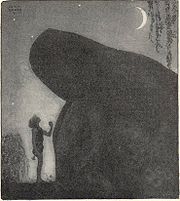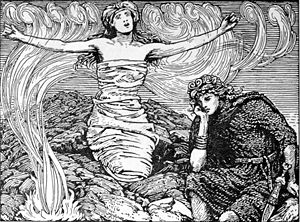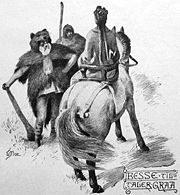
Gróa
Encyclopedia

Norse mythology
Norse mythology, a subset of Germanic mythology, is the overall term for the myths, legends and beliefs about supernatural beings of Norse pagans. It flourished prior to the Christianization of Scandinavia, during the Early Middle Ages, and passed into Nordic folklore, with some aspects surviving...
, Gróa (Old Norse
Old Norse
Old Norse is a North Germanic language that was spoken by inhabitants of Scandinavia and inhabitants of their overseas settlements during the Viking Age, until about 1300....
"growing") is a völva
Völva
A vǫlva or völva is a shamanic seeress in Norse paganism, and a recurring motif in Norse mythology....
and practitioner of seiðr, the wife of Aurvandil the Bold
Aurvandil
The names Aurvandil or Earendel are cognate Germanic personal names, continuing a Proto-Germanic reconstructed compound *Auziwandilaz "luminous wanderer", in origin probably the name of a star or planet, potentially the morning star ....
.
Prose Edda
Gróa appears in the Prose EddaProse Edda
The Prose Edda, also known as the Younger Edda, Snorri's Edda or simply Edda, is an Icelandic collection of four sections interspersed with excerpts from earlier skaldic and Eddic poetry containing tales from Nordic mythology...
book Skáldskaparmál
Skáldskaparmál
The second part of Snorri Sturluson's Prose Edda the Skáldskaparmál or "language of poetry" is effectively a dialogue between the Norse god of the sea, Ægir and Bragi, the god of poetry, in which both Norse mythology and discourse on the nature of poetry are intertwined...
, in the context of Thor
Thor
In Norse mythology, Thor is a hammer-wielding god associated with thunder, lightning, storms, oak trees, strength, the protection of mankind, and also hallowing, healing, and fertility...
's battle with the jötunn Hrungnir
Hrungnir
Hrungnir was a jötunn in Norse mythology, slain by the god Thor with his hammer Mjölnir. The account is documented in the Skáldskaparmál, in the Prose Edda by Snorri Sturluson....
. After Thor has dispatched Hrungnir with the hammer Mjollnir, Gróa is asked to help magically remove shards of Hrungnir's whetstone which became embedded in Thor's head. Unfortunately while Gróa was about her work, Thor distracted her by giving her news of her husband's whereabouts (he had earlier helped Aurvandil
Aurvandil
The names Aurvandil or Earendel are cognate Germanic personal names, continuing a Proto-Germanic reconstructed compound *Auziwandilaz "luminous wanderer", in origin probably the name of a star or planet, potentially the morning star ....
cross the river Élivágar
Élivágar
In Norse mythology, Élivágar are rivers which existed in Ginnungagap at the beginning of the world. The Prose Edda relates:The eleven rivers traditionally associated with the Élivágar include the Svöl, Gunnthrá, Fjörm, Fimbulthul, Slíd, Hríd, Sylgr, Ylgr, Víd, Leiptr and Gjöll , although many...
), telling her that her husband was now at home. Gróa's spell miscarried and the pieces of whetstone remained permanently embedded in Thor's head.
Poetic Edda

Old Norse
Old Norse is a North Germanic language that was spoken by inhabitants of Scandinavia and inhabitants of their overseas settlements during the Viking Age, until about 1300....
poem Grógaldr
Grógaldr
Grógaldr or The Spell of Gróa is the first of two poems, now commonly published under the title Svipdagsmál found in several 17th century paper manuscripts with Fjölsvinnsmál. In at least three of these manuscripts, the poems are in reverse order and separated by a third eddic poem titled, Hyndluljóð...
, (a section of Svipdagsmál
Svipdagsmál
Svipdagsmál or The Lay of Svipdagr is an Old Norse poem, a part of the Poetic Edda, comprising two poems, The Spell of Gróa and The Lay of Fjölsviðr. The two works are grouped since they have a common narrator, Svipdagr. Moreover they would appear to have a common origin since they are closely...
), by her son Svipdagr. In death she has lost none of her prophetic powers, and is able to assist him in a successful conclusion of the task which he has been set by his cruel stepmother. It is possible that this second Gróa is the same as the first one.
Gesta Danorum

Gesta Danorum
Gesta Danorum is a patriotic work of Danish history, by the 12th century author Saxo Grammaticus . It is the most ambitious literary undertaking of medieval Denmark and is an essential source for the nation's early history...
, Gro is a woman saved from marrying a giant by King Gram
Gram of Denmark
Gram was one of the earliest legendary Danish kings according to Saxo Grammaticus' Gesta Danorum. His history is given in more detail than those of his predecessors...
. In Viktor Rydberg
Viktor Rydberg
Abraham Viktor Rydberg was a Swedish writer and a member of the Swedish Academy, 1877-1895...
's elaborate theories on Norse mythology this Gro, too, is the same. http://www.northvegr.org/lore/rydberg/024.php

